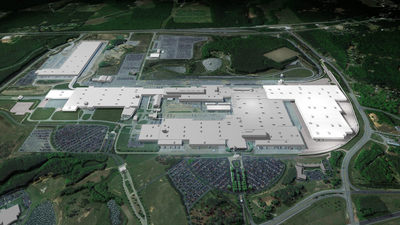Mercedes-Benz Tuscaloosa Plant: Mercedes-Benz Invests $1.3 Billion in the Expansion of its SUV Production
 Mercedes-Benz plant Tuscaloosa, Alabama, USA: The company invests $1.3 billion in the expansion of the SUV production at its US site. The rendering shows the plant area including the planned expansion (white surfaces). This includes a new Body Shop and major enhancements to the SUV Assembly Shop. |
- MBUSI (Mercedes-Benz U.S. International, Inc.) to produce future SUV generations including hybrid versions
- SUV production to be expanded – 300 new jobs
- New Body Shop, major enhancements to SUV Assembly Shop and upgraded logistics and IT systems
- Implementation of state-of-the-art technologies and end-to-end digitization of production processes in line with the smart factory approach
- Markus Schäfer, Member of the Divisional Board Mercedes-Benz Cars, Manufacturing and Supply Chain Management: “In the next years we invest $1.3 billion in the expansion of our SUV production and turn the Mercedes-Benz plant Tuscaloosa into a high-tech location. In this way we can produce the next SUV generations even more flexibly, efficiently and in proven top quality.”
- Jason Hoff, President and CEO of MBUSI: “With this expansion and modernization of our plant, we will create 300 new jobs and continue the success story of Mercedes-Benz in Tuscaloosa.”
TUSCALOOSA, AL and STUTTGART -- Sept. 18, 2015;
Mercedes-Benz expands the SUV production in the US and will create 300 new
jobs. “In the next years we invest $1.3 billion into the expansion of
our SUV production and turn the Mercedes-Benz plant Tuscaloosa into a
high-tech location,” says Markus Schäfer, Member of the Divisional
Board Mercedes-Benz Cars, Manufacturing and Supply Chain Management.
“In this way we can produce the next SUV generations even more
flexibly, efficiently and in proven top quality.”
The Mercedes-Benz plant Tuscaloosa will also assemble the
next SUV generations including the hybrid versions. The plant expansion in
this context includes a new Body Shop, major enhancements to the SUV
Assembly Shop as well as upgraded logistics and IT systems.
State-of-the-art technologies and an end-to-end digitization of production
processes enable a highly flexible production. As part of the global
production network, Tuscaloosa is connected to all Mercedes-Benz Cars
locations around the world, allowing a location-independent access to data
and process management. Every single installation and every robot, for
example, can be controlled and updated to new software programmes. Big Data
applications will be used for intelligent analyses and for an improvement
of the production processes.
“With
this expansion and modernization of our plant, we will create 300 new jobs
and continue the success story of Mercedes-Benz in Tuscaloosa,” said
Jason Hoff, President and CEO of MBUSI. “Our entire team is proud to
reinforce the State of Alabama’s growing reputation as a leader in
high-quality automotive manufacturing.”
The new 1.3-million square foot (125,000 square meters)
Body Shop will use the latest lightweight technologies with innovative
joining processes and employ a modular approach to manufacturing.
MBUSI’s current SUV Assembly Shop will be expanded by 139,930 square
feet (13,000 square meters) and receive a larger, more flexible
“marriage” station, where the body is merged with the
powertrain, allowing for production of a wider range of vehicles. The plant
will also upgrade its Logistics IT system to create a seamless integration
of the supply base into the Mercedes-Benz plant operations.
About the Mercedes-Benz Tuscaloosa
plant
The Mercedes-Benz
Tuscaloosa plant (Mercedes-Benz U.S. International - MBUSI) was the first
major automaker to open a passenger car facility in Alabama. To date,
Mercedes-Benz has made a $4.5 billion capital investment in the Tuscaloosa
operations. The plant was founded in 1995 and started production of the GLE
(Formerly M-Class) in 1997, which is now being built in the 3rd
generation. The plant added the R-Class in 2005, the GL in 2006, and the
new C-Class sedan for the North American market in 2014. In August 2015,
production of R-Class vehicles was moved to the U.S. contract manufacturer
AM-General in Mishawaka, Indiana to free production capacities to be used
for the SUV series. The latest expansion is geared towards the next SUV
generations including the hybrid versions.
MBUSI produced more than 232,000 vehicles in 2014 and is on
track to exceed 300,000 vehicles in 2015. To date, more than 2.2 million
vehicles have rolled off the plant's line for customers around the
world.
About Mercedes-Benz Cars
Operations
Mercedes-Benz Cars
Operations is responsible for passenger car production at 26 locations
around the world as part of a flexible and efficient production network
involving more than 70,000 employees. This includes the central functions
of planning, logistics and quality. Mercedes-Benz Cars produced more than
1,754,000 Mercedes-Benz and smart passenger cars last year, marking the
fourth record in a row.
The network is
based on the product architectures of front-wheel drive (compact cars) and
rear-wheel drive (for example the S-Class, E-Class, and C-Class) as well as
the SUV and sports car architectures. In addition, there is a powertrain
production network (engines, transmissions, axles and components). Each of
these production networks is grouped around a lead plant that serves as a
center of competence for the ramp-up of new products, technology and
quality assurance.
The focus of
day-to-day work is on the continuous improvement and refinement of
state-of-the-art production methods, which allow future high-tech vehicles
to be produced in a way that is efficient, flexible and environmentally
friendly, according to the typical Mercedes-Benz quality standards. All of
this revolves around the employees and their expertise, whose work is
systematically supported by ergonomic workplace design and intelligent
automation. In addition to its own production plants, Mercedes-Benz is
increasingly leveraging partnerships and utilizing capacities at contract
manufacturers as part of its growth strategy.



